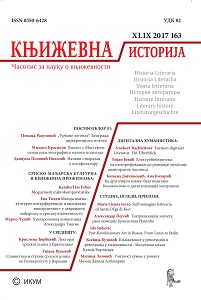Књижевност у револуцији и револуција у књижевности: Мануелова књига Хулија Кортасара
Literature in the Revolution and the Revolution in the Literature: Julio Cortázar’s A Manual for Manuel
Author(s): Ksenija M. VulovićSubject(s): Other Language Literature
Published by: Институт за књижевност и уметност
Keywords: Julio Cortázar;A Manual for Manuel [Libro de Manuel];politics,revolution; “new man”;experimental literature;reading;
Summary/Abstract: Although absent from the first three novels by the Argentinean author JulioCortázar, the topic of revolution occupies the central position in A Manual for Manuel. Cortázar’s fourth novel deals with the conquest of liberty at a number of different,yet interconnected levels, among which the political and the literary levels are especially emphasized. Depending on their own political affinities and as a reaction to the highly fictional plot of the novel, the critics have either condemned or praised the presence of the everyday politics in the novel. Nevertheless, the presence of the political and philosophical idea of the necessity of the existence of “a new man” in the contemporary society repositions A Manual for Manuel from the sphere of political pamphlets into the category of innovative thesis novels. The political revolutionary ideas in Cortázar’s novel are followed closely by the aspirations of a literary revolution as a prerequisite for all social changes. Cortázar is opposing the fictional plot of the novel to the newspaper clippings, which are incorporated into the text in their entirety, and by using this technique, he questions the genre definition of A Manual for Manuel. Through the process of reduplication of the narrating instancesand through reiteration of the authorial figures, and by the death of one of the dominant narrators and the writer’s alter ego, Cortázar manages to relativize the privileged role of the author and grants particular significance to the reader. The experimental narrative techniques invite the reader to an active and involved reading,in spite of the simplicity of the plot that renders the reading more passive and deprived of an even greater responsibility. The reader’s task in A Manual for Manuel seems to be less important in the theoretical terms and less innovative in comparison to Cortázar’s previous novels, but this is compensated by the extraordinary life significance and the influence of reading on the creation of the revolutionary changes in society.
Journal: Књижевна историја
- Issue Year: 49/2017
- Issue No: 163
- Page Range: 307-326
- Page Count: 20
- Language: Serbian

